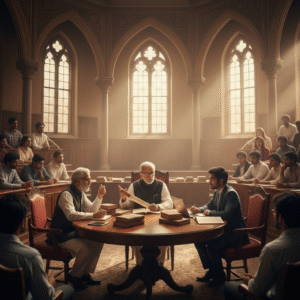Aligning Convictions with Actions in a Changing World
Beliefs are often considered the bedrock of individual and societal identity, shaping how we perceive the world and interact with it. Yet, a deeper question arises: Do our beliefs genuinely reflect our core values, or are they shaped by external pressures, inherited traditions, or societal expectations? In India, a land rich in cultural and spiritual diversity, this introspection becomes especially relevant, given the complex interplay between deeply rooted traditions and the evolving values of modern life.
The Gap Between Belief and Action
In many cases, there exists a dissonance between professed beliefs and actual behavior:
- Religious Principles vs. Practice: Most religions espouse values like compassion, equality, and forgiveness. Yet, acts of intolerance or discrimination—whether based on caste, religion, or gender—often contradict these principles. For instance, the persistence of caste-based exclusion starkly contrasts the egalitarian ideals espoused in many faiths.
- Environmental Stewardship: In Indian traditions, nature is often revered as sacred, with rivers like the Ganga considered holy. However, widespread pollution and environmental degradation reveal a disconnect between the belief in nature’s sanctity and the actions that harm it.
- Cultural Norms and Gender Equality: While Indian mythology celebrates strong female figures like Durga and Sita, societal practices often perpetuate patriarchal norms, limiting women’s freedom and opportunities.
The Role of Societal Pressures
Many beliefs are shaped not by individual values but by societal expectations:
- Conformity for Acceptance: Individuals often adopt beliefs that align with community norms to avoid ostracism, even if these beliefs conflict with personal values. For example, pressure to conform to traditional marriage customs may override personal convictions about autonomy or love.
- Inherited Beliefs: Many people inherit religious or cultural beliefs without critically examining them. This unquestioning acceptance can lead to actions that reflect societal norms rather than personal values.
Reconciling Beliefs with Values
Bridging the gap between beliefs and values requires conscious effort and reflection:
- Critical Self-Examination: Individuals must question whether their beliefs truly align with their values or if they are simply following inherited traditions or external pressures.
- Emphasizing Universal Values: Many religious and philosophical systems share core values, such as kindness, justice, and humility. Focusing on these commonalities can help align beliefs with actions.
- Education and Awareness: Encouraging critical thinking through education can empower individuals to reconcile their beliefs with their true values, fostering a culture of introspection and dialogue.
Signs of Change
In modern India, there are growing signs that individuals and communities are beginning to align their beliefs more closely with their values:
- Youth-Led Movements: Younger generations are increasingly questioning inherited beliefs, advocating for causes like gender equality, environmental conservation, and LGBTQ+ rights, which reflect their evolving values.
- Interfaith and Social Initiatives: Groups that emphasize shared human values over doctrinal differences are fostering inclusive communities that prioritize actions over rigid beliefs.
- Spiritual Exploration: Many Indians are turning to meditation, yoga, and other introspective practices to discover personal truths that transcend traditional religious frameworks.
Conclusion: A Journey Toward Authenticity
In a rapidly changing world, aligning beliefs with true values is both a personal and societal challenge. India, with its rich tapestry of traditions and a dynamic modern identity, stands at a unique crossroads. By fostering dialogue, introspection, and education, individuals and communities can ensure that their beliefs are not only reflective of inherited norms but also of the values they hold dear.
Ultimately, the alignment of beliefs and values is a journey toward authenticity—one that empowers individuals to live with integrity and societies to thrive in harmony. The question remains: Are we ready to take that journey?










